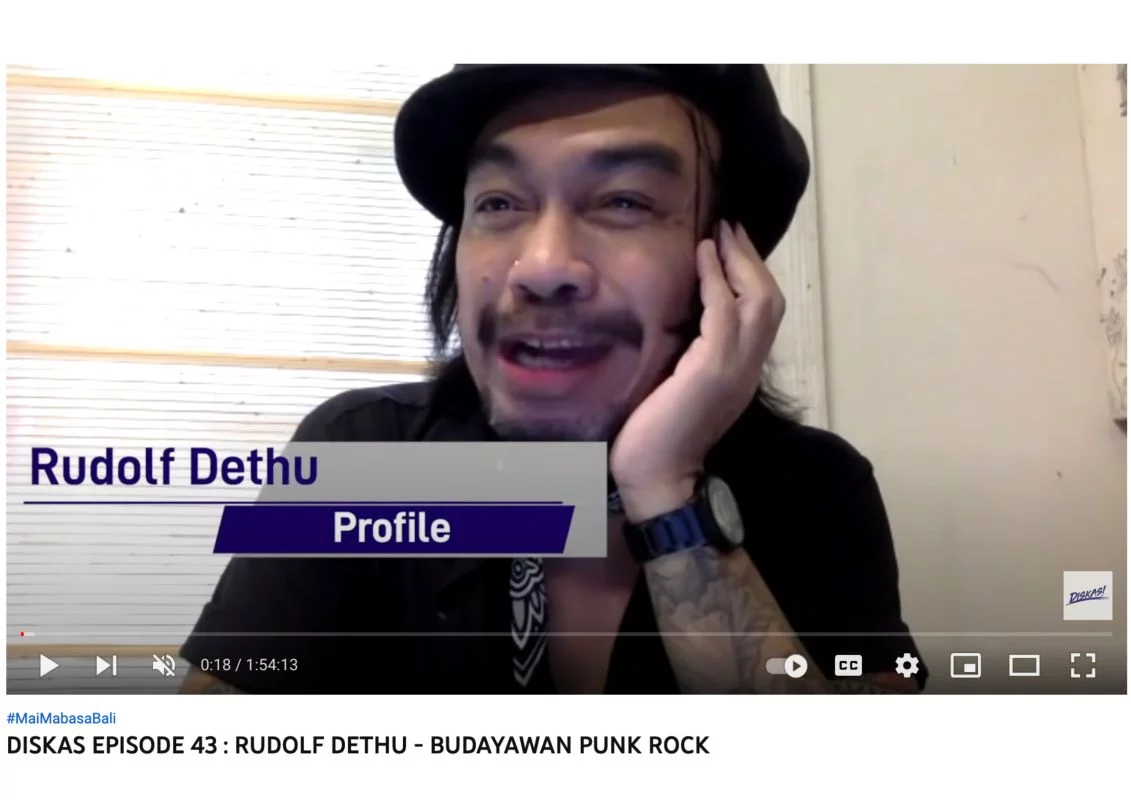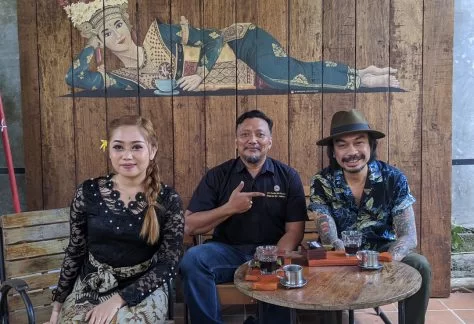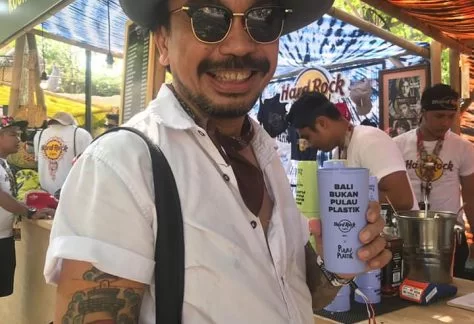
Bali coffee has perhaps not yet quite received the respect it deserves. Very few people aware of how unique and distinctive Bali coffee is—to drink imported coffee is considered much cooler. Rai Bangsawan is making people understand better about our coffee culture, based on local wisdom.
This is not about nationalism. This is about a guy who believes that Bali coffee is in many ways superior to imported coffee.
I like Bali coffee a lot. I drink it at least twice a day, every single day. Your new coffee-rendezvous place in Kerobokan, Kopi Kultur, has made me appreciate Bali coffee even more. Is this your goal, to reintroduce Bali coffee?
It all started from anxiety, worrying, how—status wise—Bali coffee has dropped down, in recent times. Ayip, Suarnatha and I, we had regular and evolving discussions about this degradation. We shared the same concern: local coffee should be “successful”, especially in its own home. It should get a certain respect—especially as Bali coffee is not just another type of coffee. As you must know, Bali coffee is unique, and can absolutely compete in global markets as long as it is handled cleverly; from cultivation, land execution, proper harvest and post-harvest processes, sophisticated marketing tactics, and so on. The other value-added aspect is that Bali coffee grows on a “ring of fire”, volcanic type of land. That factor alone already creates distinctive taste and flavour.
So three of us agreed to reintroduce, and try to rebrand, Bali coffee via Kopi Kultur. To make sure that appreciation from the public would be achieved, I spent some time with guests asking about what kind of coffee they want to try, what kind of coffee they would pick, and why. And also just chatted to see how much they already recognised the uniqueness of Bali coffee.
Have you always been interested in coffee?
I was introduced to coffee from an early age. I was 4 at the time, I remember my grandfather, almost every single morning, shared a sip or so of his coffee with me. I became hooked. I even love smelling coffee flowers. As a kid I felt that coffee has this mysterious aspect. While in my village, morning time means the village is deliciously infected by the aroma of coffee.

My knowledge about coffee comes mostly from self learning. It started from watching my grandfather taking care of his coffee plants, pre till post processing. Even though I don’t fully follow the technique he used back then, it has definitely enriched me, and inspired me. From that point on I began to learn how to prepare the land, understand how coffee grows, and learn how to be a proper coffee farmer. I have also learnt about Bali coffee culture, how to polish my sense of taste and smell, and about the ritual and technique of mixing and brewing. I then went to Jakarta to upgrade my coffee knowledge further, and studied to be a qualified barista.
Fresh Manggarai coffee cherry collections
How’s the public reaction with your Bali coffee reintroduction? Is Kopi Kultur now an exquisite “coffee retreat” as you planned? Is it effective in making people totally wake up and (re)smell the coffee?
I’m blown away. I almost can’t believe how beautiful the public reaction has been. We never really set an ambitious target. We just wanted to reintroduce Bali coffee so it gets better respect by actively interacting with the guests, socialising the coffee with warm gestures, giving each guest a personal experience, because to me, to us at Kopi Kultur, drinking coffee is a private ritual. We offer coffee crafting rather than relying too much on hi-tech coffee machines. This is what we call “Theatre of Coffee”. People seem to really like it.
On a lighter note, from all this coffee-craze there’s some enlightening news: a lot of the visitors who were apprehensive to drink coffee due to gastric issues, have dared to drink coffee again after we guaranteed that our coffee is healthy, and will not cause problems with stomach ulcers.
What do you have in mind with Kopi Kultur, focusing solely on the art of coffee or introducing cuisine also?
We also serve tea, healthy juices, beer, also a limited food menu, like grilled fish. But maybe the most special item, other than our coffee is nasi bambu (bamboo rice) which has 9 different types of organic rice and vegetables with options of fish or meat. This cuisine is inspired from villages that have the tradition of making nasi bambu. We modified it a bit so it’s more presentable and healthier.
Do you continue with your farming business?
My farming business and Kopi Kultur are related to each other. We first educate the farmers to create the best products from their soil, and the next step is to distribute those good quality products to the market. This is the challenge for us, so that people out there can also understand that Balinese coffee is valuable. Kopi Kultur has to be able to integrate a village product, maintain quality and incorporate modern, attractive packaging so it becomes a premium product. Kopi Kultur is like a hip place to showcase the products from the farmers, a fashionable hangout place to convince the city people that the products from the village are worth giving a chance. If this is successful, the farmers will also be convinced that they are doing the right thing (and forget their dreams to work in hotels or in the tourism industry with very small salaries). Hopefully it will also make them hesitate to sell their land.

Kopi Kultur takes up just a small part of a massive property, which is Wisnu Open Space. Not long from now Wisnu Open Space will operate its organic farming field out the back of our cafe. Hopefully this can be a positive model, a live lab and experiment centre for urban farming, developing organic vegetables and fruit.
Now let’s get personal, what’s your favourite coffee other than your own?
Kopi Bali Arabica Tamblingan a.k.a. coffee from the lost city which actually originated from Ethiopia.
Any last nagging words?
Be very careful, dark roast coffee is dangerous for your body. It’s unhealthy due to the sugar inside the green beans. When over heated, they transform into carcinogens, the substance which causes cancer. Be knowledgeable, coffee when processed correctly it is perfect in helping you to stay healthy due to contain very high anti oxidant (1300).
______________________
*Homegrown & Well Known is my biweekly column in The Beat (Bali) mag. Basically it’s an interview via e-mail with Bali’s local big shots. This is the fifteenth edition and was firstly published on The Beat (Bali) #321, Sep 28 – Oct 11, 2012
*Photo of Kopi Kultur building courtesy of Komang “Totok” Parwata



